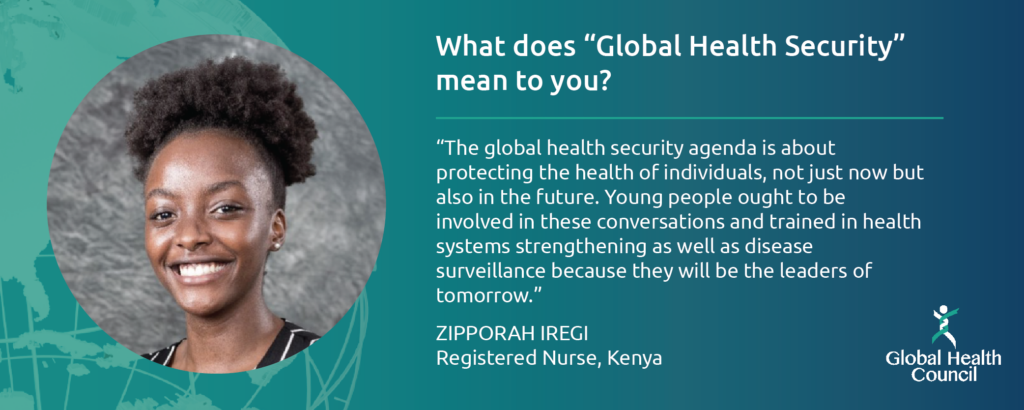Symposium Blog Series: Zipporah Iregi

In the second blog in our series highlighting some of the diverse organizations and individuals who will be attending the Global Health Landscape Symposium, we are speaking with Zipporah Iregi a Registered Nurse in Kenya. We were moved by Zipporah’s remarks at the White House Global COVID Summit and are excited to share her unique point of view with Global Health Council members now!
How do you define the term “global health security”?
“Global health security” means putting measures in place to secure a better future for health. It means strengthening health care systems and surveillance capacity to prevent outbreaks and ensure early detection and a quick response to infectious disease threats.
Does including the “security” terminology help or hurt efforts in terms of influencing policy and funding decisions?
Security helps in putting these strategies into place. It cements the need for us to build a secure future by putting structures in place to protect people from infectious diseases.
How does the current “global health security” narrative affect marginalized communities?
The global health security narrative dictates that no person should be left behind, regardless of where they are from, their social strata, geographical location, or economic status. The aim is to ensure health security even for those who are marginalized.
Some of the core principles that the global health security agenda is pegged on are inclusion and partnerships. With these in mind, countries and organizations have partnered together to reach all people. For example in Kenya, the Centers for Disease Control, alongside the national government, ensured hand hygiene was improved for those living in refugee camps. The campaign leveraged the attention on COVID-19 to bring attention to the importance of hand hygiene, not only in terms of the current crisis but in general. To date, 30 handwashing stations were built at schools, five in healthcare facilities, and 60 have been installed in community settings such as public markets.
However, there is still a long way to go to achieve equity and inclusion. We must recognize that there are a lot of disparities — especially between countries — in economic and social status, as well as in terms of technological advancement. These influence, to a great extent, the level of preparedness and response countries have in preventing and fighting infectious disease threats. For instance, most lower- and middle-income countries are still left with the heavy burdens of HIV, tuberculosis, and malaria to date.
How should we balance equity, access, and security in global health?
We can do this by ensuring each country is empowered to be proactive in the early detection and response to infectious disease threats. This involves financing lower- and middle-income countries to support global health measures and training the health care workforce and the community health workers so that they have the necessary skills.
Can you think of a recent example, perhaps during COVID-19, of global health security interventions and preparedness efforts that worked really well in your country?
During the COVID-19 period, there was a nationwide polio campaign, Kenya Polio Free. It was launched in the 13 counties at risk of having children infected with polio. The healthcare workers were trained on how to conduct the campaign, conduct door-to-door visits in the communities, detect cases of acute flaccid paralysis (a symptom of polio) — all while cautiously following COVID-19 guidelines. The government ensured that they had the appropriate personal protective equipment (PPE) needed — face masks, shields, and sanitizers. As the health care workers and community health workers carried out the campaign and vaccination of children under five against polio, they also taught families and communities on COVID-19 and what they needed to do to be safe.
What would you like to see come out of GHC’s Global Health Landscape Symposium?
I am hoping that through the sharing of experiences, countries, and organizations will forge even stronger partnerships and identify strategies to aid in the sharing of knowledge and technology so that no person is left behind in the global health response.
Is there anything else you’d like to share about the Global Health Landscape Symposium or this topic?
The global health security agenda is about protecting the health of individuals, not just now, but also in the future. Therefore, young people ought to be involved in these conversations and trained in health systems strengthening and disease surveillance because they will be the leaders of tomorrow. Only then can the future of health be assured.